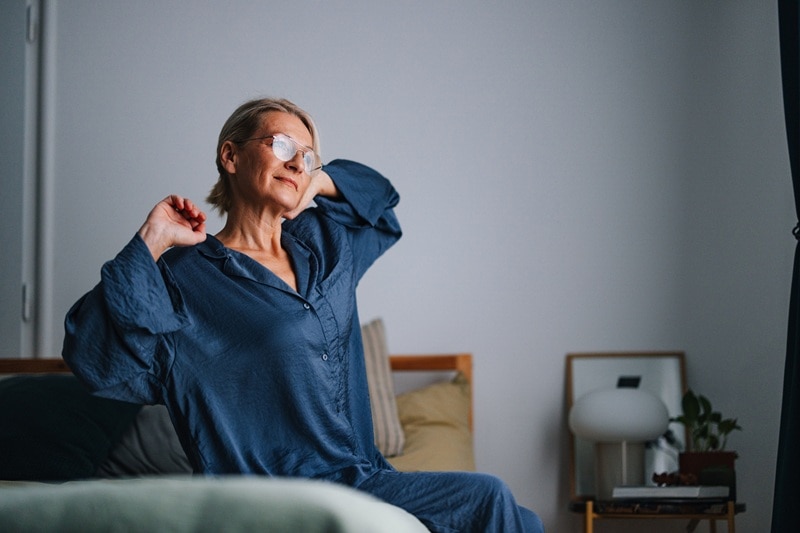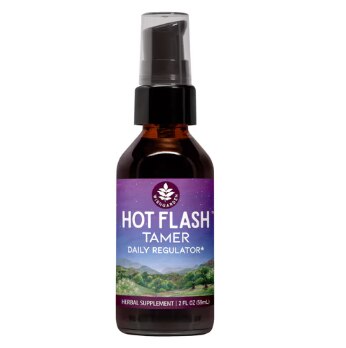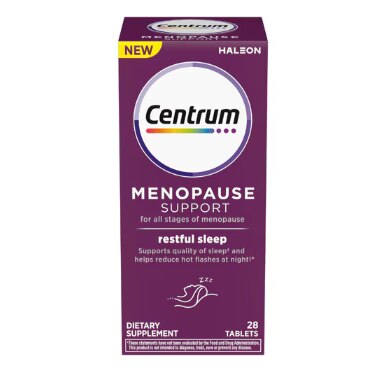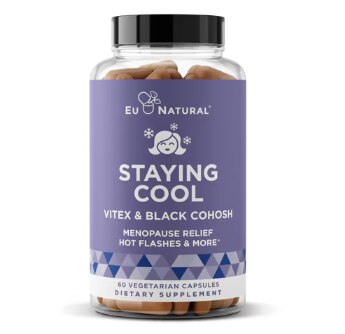Night sweats, also called nocturnal hyperhydrosis, are pretty much what they sound like. It’s when you experience excessive sweating to the point of drenching your clothes or sheets – at night. While there are various causes for night sweats, such as certain medications and health conditions, the most common reason is menopause.
Menopause occurs when a woman has not had her period for 12 months. The time leading up to menopause is called perimenopause. Many women start to experience menopause symptoms such as night sweats and hot flashes during perimenopause, which can last from four to seven years.
About 75% of women going through menopause experience night sweats and hot flashes, which are similar to night sweats but happen during the day and are not as severe. Additionally, about a third of women will go on to have night sweats for up to a decade or more after menopause.
The bottom line is that if you experience night sweats, they can be disruptive to your sleep and lifestyle and, for some women, last a pretty long time. Therefore, it’s important to know what’s causing your night sweats and how to minimize and manage them.
Menopause Night Sweats
Perimenopause usually hits women in their 40s, with the average age of menopause being 51. During perimenopause, your hormone levels fluctuate and eventually drop during menopause. This hormonal roller coaster and decline can impact your hypothalamus, the part of your brain that regulates body temperature.
With your hormone levels sending mixed signals, the hypothalamus can set your body temperature too high, prompting your sweat glands to go into overdrive to cool it down. You may expect to be drenched in sweat while exercising, but not when you’re just lying in bed.
Night sweats can severely impact your sleep, mood and quality of life. Fortunately, there are effective ways to treat these problematic sweating episodes so you can go back to having a good night’s sleep and wake up rested and positive.
The difference between night sweats and hot flashes
While it’s always been assumed that night sweats are just hot flashes that happen at night, new research shows that they are actually two different things. Hot flashes can occur during the day AND night and, like night sweats, result in uncomfortable heat and sweating. However, there is less sweating during a hot flash, and they don’t last as long.
Night sweats only happen at night and produce much more perspiration, leading to the feeling of being drenched. Additionally, they last longer and decline more slowly, and are linked to higher levels of stress than hot flashes.
Can hormone therapy help, and is it safe?
If menopause is the cause of your hot flashes, the most effective treatment to manage them is hormone therapy (HT) – estrogen and progesterone if you have a uterus and estrogen-only if you don’t.
If the thought of hormone therapy scares you or you think the risks are too high, you should take a look at some recent reports. The bad rap hormone therapy has (or had) is based on a study called The Women’s Health Initiative that was halted in 2002 with reports of an increased risk of breast cancer.
However, it turns out that study participants were older than the age at which women would typically start hormone therapy for menopause symptoms. Additionally, there are newer types of HT and various doses that can reduce risk.
Newer studies show that the benefits most likely outweigh the risk for women who start hormone therapy before age 60 or within 10 years of menopause. HT also protects against osteoporosis and helps prevent muscle mass loss, both common conditions in aging women, in addition to minimizing night sweats and hot flashes.
Nonhormonal Treatment Options for Night Sweats
For women who can’t take HT or prefer not to, there are lifestyle and other medication treatment options that can help minimize night sweats and sleep issues. Women with a history of breast, uterine or ovarian cancer are advised not to take HT.
One of the first things you should do if you wake up drenched in sweat is to switch to lightweight sleepwear and keep your room cool and dark. Fans and breathable sheets can also help. Other treatment treatment options include:
Cognitive behavioral therapy
Studies show that cognitive behavioral therapy (CBT) can effectively reduce the impact of vasomotor symptoms and improve sleep. Subsequently, it can improve the quality of life for women experiencing disruptive night sweats.
Diet
Avoiding foods that can affect your body temperature or disrupt sleep, such as alcohol, spicy foods and caffeine, before bed or late in the day, may help prevent triggering night sweats. Furthermore, eating certain foods such as tofu, whole grains and berries can help reduce the frequency and severity of night sweats.
Relaxation techniques
Night sweats can be stressful. Practicing relaxation techniques such as deep breathing, meditation, guided imagery and mindfulness can help you sleep better and minimize the impact of night sweats.
Medications
There are two non-hormonal medications that are FDA-approved to treat hot flashes. One is paroxetine, which is an antidepressant, and the other is fezolinetant, which was developed to treat hot flashes and night sweats specifically. Additionally, there are medications for other conditions that are used off-label to treat hot flashes.
The bottom line is that you don’t have to suffer or lose sleep if you’re experiencing night sweats! Talk to a menopause specialist or your doctor to find the best treatment option to help relieve your symptoms.




